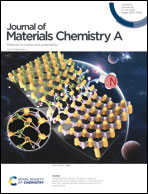Enhancing solar–thermal–electric energy conversion based on m-PEGMA/GO synergistic phase change aerogels†
Abstract
Thermoelectric power generation from solar radiation or waste heat has attracted tremendous attention due to strong global demand for cost-effective, pollution-free forms of energy conversion. However, the storage and sustainable release of thermal energy, as essential factors for thermoelectric generators (TEGs), remain great challenges. Herein, a TEG based on phase change aerogels (PCAs) has been fabricated to enhance the solar–thermal–electric energy conversion. The PCAs exhibit synergistic phase change properties, excellent thermal reliability, and shape-stabilized properties and can overcome the drawbacks of enthalpy degradation and leakage existing in the phase change materials (PCMs). Under the radiation of simulated solar light, the voltage and current output of the PCA-loaded TEG (∼144 mV, 14.8 mA) are approximately 3 times and 2.7 times that of a blank one (∼48 mV, 5.4 mA), respectively, and the thermal-to-electricity conversion maximum efficiency is enhanced by about 61.3% compared to that of the blank one. The sustained thermal release based on PCAs enables a sustainable electric output when solar light or the heat source is removed. In proof-of-concept experiments, the PCA-loaded TEGs can instantly light up commercial LEDs, drive various portable electronic gadgets, and charge several different capacitors. The sustainable lighting time of eighty green LEDs directly powered by PCA-loaded TEGs is about 4 times longer than that of the blank one. In particular, the maximum value of the voltage difference (ΔV) of LEDs powered by PCA-loaded TEGs and the blank one is up to 1.74 V. Therefore, the PCA-loaded TEGs have enhanced power supply capability when removing solar radiation or the heat source. This study expands the application of PCMs in TEGs and promises a new potential application in advanced energy-related devices and systems for solar energy utilization and storage, self-powered sensing systems, waste heat reuse and other fields.



 Please wait while we load your content...
Please wait while we load your content...